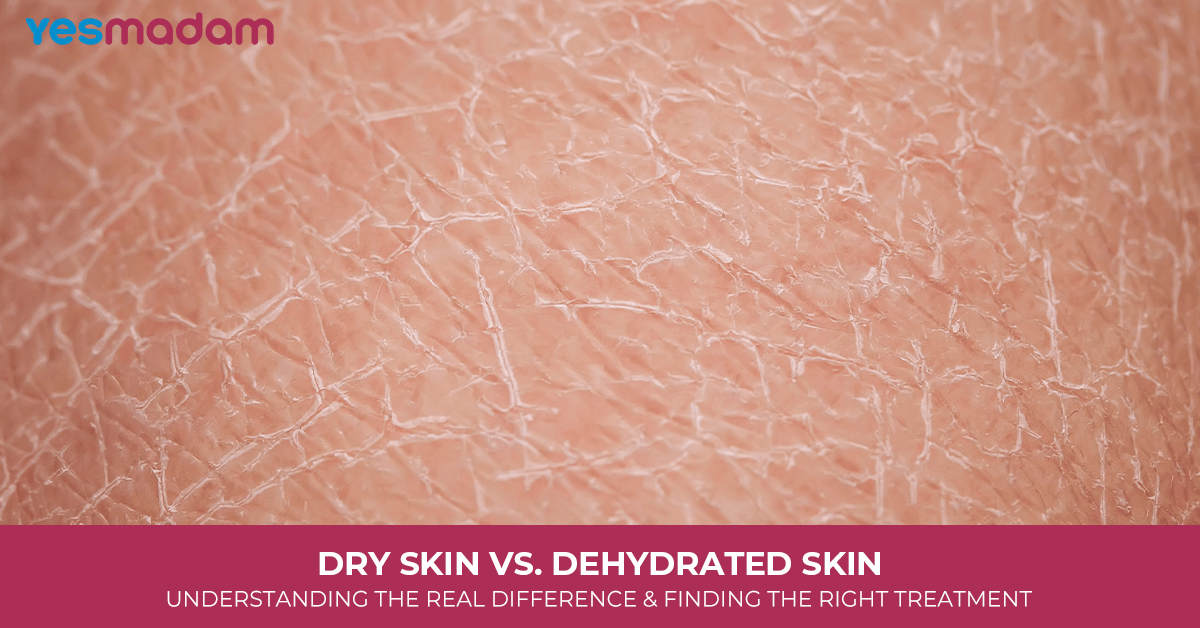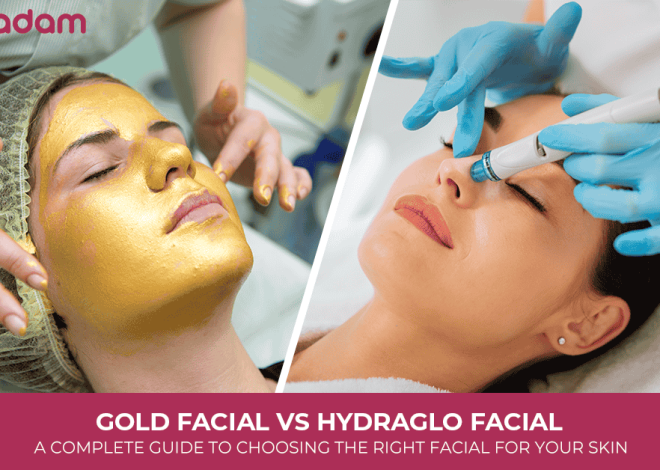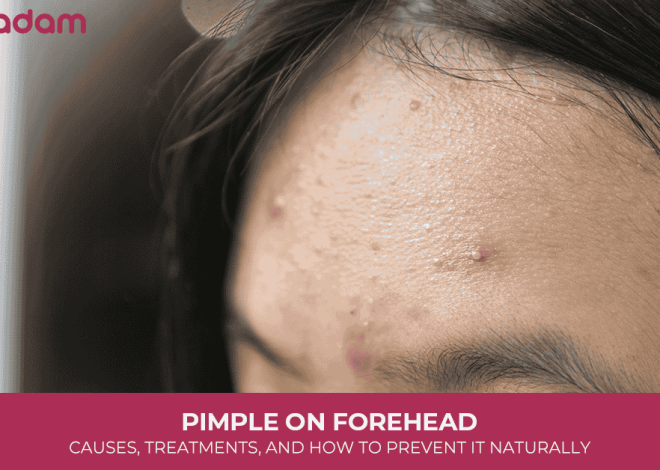
Dry Skin vs. Dehydrated Skin: Understanding the Real Difference and Finding the Right Treatment
Have you ever stood in front of the mirror, wondering why your skin feels tight one day and flaky the next? Many people assume dryness and dehydration are the same thing, but they’re not. The truth is, dry skin vs. dehydrated skin is one of the most misunderstood topics in skincare.
Here’s the catch: you might think your skin is dry, but it could just be thirsty. And treating your skin incorrectly—say, slathering oils on when it actually needs water, can leave you frustrated, with results that never seem to last.
This blog breaks down everything you need to know about dehydrated skin vs. dry skin. We’ll talk about how to spot the difference, what causes each, and the best ways to treat them so you can get back to feeling confident in your own skin.
Table of Contents
Dry Skin vs. Dehydrated Skin: The Core Difference
Let’s start with the basics, because understanding the root difference makes all the difference in your skincare journey.
Dry Skin is a Skin Type
Think of dry skin as a personality trait, it’s simply how your skin is wired. Dry skin doesn’t produce enough natural oils (called sebum). Without enough oil, the protective barrier struggles to keep moisture locked in.
- Imagine it like a brick wall without enough cement between the bricks—things can easily slip through. That’s what happens with dry skin: moisture escapes, leaving roughness and flakiness behind.
Dehydrated Skin is a Condition
Dehydrated skin, on the other hand, is temporary. It’s not about how much oil your skin produces, it’s about how much water it’s holding onto. Even someone with oily skin can be dehydrated.
- Think of it like a sponge: even if it’s oily on the surface, it can still be completely dry inside if it hasn’t been soaked in water.
So, the dry skin vs dehydrated skin difference boils down to this:
- Dry skin = not enough oil.
- Dehydrated skin = not enough water.
Symptoms: How to Tell the Two Apart

The hardest part is that they can look similar. Both conditions can make your skin appear dull, flaky, or uncomfortable. But paying attention to the little details will help you identify whether you’re dealing with dryness or dehydration.
Common Symptoms of Dry Skin
If you have dry skin, you might notice:
- Persistent flakiness: especially around your cheeks, forehead, or hands.
- Itchiness and discomfort: it feels tight all the time, no matter what products you use.
- Rough texture: skin feels uneven to the touch.
- Prone to irritation: redness or cracking, especially in winter.
Common Symptoms of Dehydrated Skin
With dehydrated skin, you may experience:
- A dull, tired look: skin loses its glow and seems lifeless.
- Fine lines that appear suddenly: especially “crepey” lines when you smile or pinch your cheek.
- Tightness after cleansing: but the feeling eases once you moisturize.
- Excess oil in unexpected places: as your skin tries to balance itself out.
- Makeup that doesn’t sit right: foundation clings, creases, or highlights dryness.
Here’s a quick way to test: gently pinch your cheek. If it looks wrinkled and doesn’t spring back, your skin is likely dehydrated.
Causes: What’s Really Happening Beneath the Surface

Knowing the cause is half the battle, it not only helps you choose the right skincare but also makes prevention possible.
Why You Might Have Dry Skin
Dry skin is usually a built-in trait, but it can worsen with certain factors:
- Genetics: Sometimes, it simply runs in the family.
- Aging: Oil production decreases as we get older.
- Harsh skincare products: Soaps and foaming cleansers often strip away natural oils.
- Medical conditions: Eczema, psoriasis, and thyroid issues can all trigger dryness.
Why You Might Have Dehydrated Skin
Dehydrated skin is more about lifestyle and environment:
- Not enough water: If you’re not drinking enough fluids, your skin feels it too.
- Too much caffeine or alcohol: Both dehydrate your body and your skin.
- Weather and environment: Dry climates, central heating, and air conditioning sap moisture.
- Over-exfoliation: Stripping your skin barrier leads to water escaping too quickly.
- Poor skincare balance: Using only oils without hydrating ingredients can make matters worse.
Treatments: How to Care for Each Condition

Here’s where things get interesting: if you treat dry skin the same way you treat dehydrated skin, you might not see results—or worse, you might make things worse.
How to Treat Dry Skin
Since dry skin lacks oil, you need to replenish and protect it.
- Use richer moisturizers: Go for creams and balms with ingredients like ceramides, squalane, and shea butter. These mimic your natural oils.
- Switch to gentle cleansers: Avoid foaming products. Creamy, hydrating cleansers are best.
- Lock in moisture: Apply your moisturizer while your skin is still damp to trap water inside.
- Add nourishing oils: Facial oils with jojoba or argan oil can give your skin the extra boost it needs.
- Protect your barrier: Products with fatty acids and cholesterol help repair skin from within.
How to Treat Dehydrated Skin
Dehydrated skin craves water, so the focus is on hydration.
- Incorporate humectants: Look for hyaluronic acid, glycerin, or aloe vera in serums.
- Drink more water: Internal hydration plays a huge role.
- Limit dehydrating habits: Cut back on alcohol and excess caffeine.
- Layer hydration: Start with a hydrating serum, then follow with a moisturizer to seal it in.
- Use facial mists: Reapply throughout the day to refresh and rehydrate your skin.
Lifestyle Tips for Long-Term Skin Health
Skincare products help, but habits and lifestyle make the biggest difference.
- Hydrate from the inside out: Carry a water bottle and sip regularly throughout the day.
- Eat for your skin: Foods rich in omega-3 fatty acids (like salmon, chia seeds, walnuts) support dry skin, while water-rich fruits and veggies help dehydration.
- Protect your skin from the elements: In cold weather, wear scarves; in hot climates, apply SPF and hydrating sprays.
- Balance your skincare routine: Instead of chasing every new product trend, stick to the basics your skin needs—hydration, moisture, and protection.
Conclusion
At the end of the day, the dry skin vs. dehydrated skin difference comes down to oil versus water. Dry skin lacks oils and is usually long-term, while dehydrated skin lacks water and is temporary.
By recognizing the symptoms of dry skin vs. dehydrated skin, you’ll be able to make smarter decisions about your routine. And with the right dry skin vs dehydrated skin treatment, you can restore your skin’s natural balance, whether that means adding nourishing creams or hydrating serums.
The takeaway? Pay attention to your skin, listen to what it’s telling you, and give it exactly what it needs. Healthy, glowing skin isn’t about guessing; it’s about understanding.
FAQs
1. How do I test if my skin is dehydrated?
Try the pinch test. Gently pinch your cheek, if it wrinkles and doesn’t bounce back quickly, that’s a sign of dehydration.
2. Can someone have both dry and dehydrated skin at the same time?
Yes, and it’s more common than you think. You can have a skin type that doesn’t produce enough oil (dry), while also lacking water (dehydrated).
3. What’s the fastest way to relieve dehydrated skin?
Applying a hydrating serum with hyaluronic acid and then sealing it in with a moisturizer can give instant relief. Drinking water throughout the day helps too.
4. Are natural oils enough to treat dry skin?
Oils can help, but they work best when combined with moisturizers that contain ceramides and fatty acids. Oils alone won’t rebuild your skin barrier.
5. Does climate affect dry and dehydrated skin differently?
Yes. Cold weather often makes dry skin worse by stripping oils, while hot, dry environments or air conditioning tend to trigger dehydration.
6. How often should I exfoliate dry or dehydrated skin?
Once or twice a week is enough. Over-exfoliating can worsen both conditions, but gentle exfoliation can remove dead cells and improve absorption.
7. Can drinking more water fix dry skin?
Not exactly. While hydration helps dehydrated skin, dry skin needs oil-based products and barrier repair, not just water.
8. Is dehydrated skin permanent?
No, it’s temporary and can be fixed with the right lifestyle and skincare adjustments. Unlike dry skin, it isn’t a permanent trait.
9. Can stress make skin dehydrated?
Yes, stress hormones can affect your body’s ability to retain water, leading to dehydrated skin. It also weakens the skin barrier over time.
10. Should I change my skincare routine seasonally?
Definitely. Winter often calls for richer creams to combat dryness, while summer may require lightweight hydrating serums to fight dehydration.



